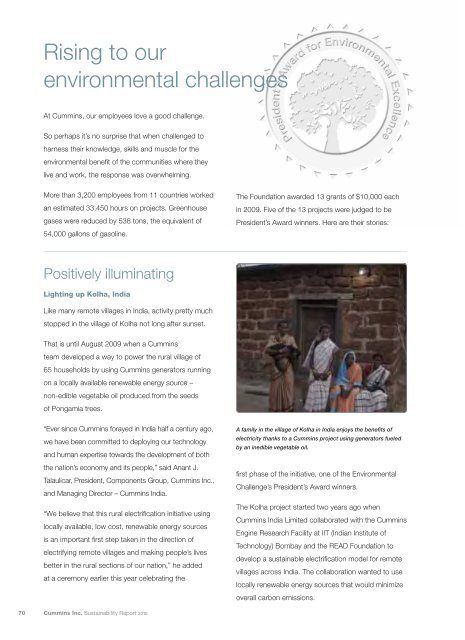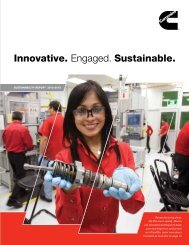2010 Sustainability Report - Cummins.com
2010 Sustainability Report - Cummins.com
2010 Sustainability Report - Cummins.com
You also want an ePaper? Increase the reach of your titles
YUMPU automatically turns print PDFs into web optimized ePapers that Google loves.
Rising to our<br />
environmental challenges<br />
At <strong>Cummins</strong>, our employees love a good challenge.<br />
So perhaps it’s no surprise that when challenged to<br />
harness their knowledge, skills and muscle for the<br />
environmental benefit of the <strong>com</strong>munities where they<br />
live and work, the response was overwhelming.<br />
More than 3,200 employees from 11 countries worked<br />
an estimated 33,450 hours on projects. Greenhouse<br />
gases were reduced by 538 tons, the equivalent of<br />
54,000 gallons of gasoline.<br />
The Foundation awarded 13 grants of $10,000 each<br />
in 2009. Five of the 13 projects were judged to be<br />
President’s Award winners. Here are their stories:<br />
Positively illuminating<br />
Lighting up Kolha, India<br />
Like many remote villages in India, activity pretty much<br />
stopped in the village of Kolha not long after sunset.<br />
That is until August 2009 when a <strong>Cummins</strong><br />
team developed a way to power the rural village of<br />
65 households by using <strong>Cummins</strong> generators running<br />
on a locally available renewable energy source –<br />
non-edible vegetable oil produced from the seeds<br />
of Pongamia trees.<br />
“Ever since <strong>Cummins</strong> forayed in India half a century ago,<br />
we have been <strong>com</strong>mitted to deploying our technology<br />
and human expertise towards the development of both<br />
the nation’s economy and its people,” said Anant J.<br />
Talaulicar, President, Components Group, <strong>Cummins</strong> Inc.,<br />
and Managing Director – <strong>Cummins</strong> India.<br />
“We believe that this rural electrification initiative using<br />
locally available, low cost, renewable energy sources<br />
is an important first step taken in the direction of<br />
electrifying remote villages and making people’s lives<br />
better in the rural sections of our nation,” he added<br />
at a ceremony earlier this year celebrating the<br />
A family in the village of Kolha in India enjoys the benefits of<br />
electricity thanks to a <strong>Cummins</strong> project using generators fueled<br />
by an inedible vegetable oil.<br />
first phase of the initiative, one of the Environmental<br />
Challenge’s President’s Award winners.<br />
The Kolha project started two years ago when<br />
<strong>Cummins</strong> India Limited collaborated with the <strong>Cummins</strong><br />
Engine Research Facility at IIT (Indian Institute of<br />
Technology) Bombay and the READ Foundation to<br />
develop a sustainable electrification model for remote<br />
villages across India. The collaboration wanted to use<br />
locally renewable energy sources that would minimize<br />
overall carbon emissions.<br />
70 <strong>Cummins</strong> Inc. <strong>Sustainability</strong> <strong>Report</strong> <strong>2010</strong>















